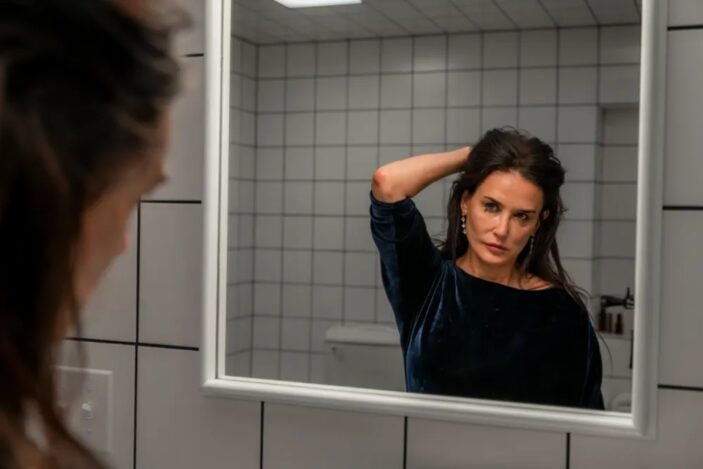
The idea of wanting to be younger and create a more perfect aesthetic version of one’s self is a thought many (if not all) of us have conjured at one point or another. And so often do the two go hand-in-hand, despite the fact that being younger and looking better aren’t always reliant on the other. They are two separate entities, and in Coralie Fargeat‘s deliciously vile The Substance, each take on a life of their own, resulting in a bombastic body horror black comedy-cum-cautionary tale that takes the most wicked of pleasure in submitting to its exaggerated nature.
An adored star in her own right, Elisabeth Sparkle (Demi Moore, committing to the cause in every way possible) has made a name for herself in the televised fitness sector of entertainment. But, unlike her namesake, the sparkle of her relevance is dwindling, and her lecherous studio head, Harvey (Dennis Quaid, disgustingly good), has decided that it’s time for a younger face to spearhead his vision; an early sequence where he talks around the issue whilst eating prawns, which Fargeat shoots with an unnerving closeness, speaks early on to the film’s penchant for celebrated discomfort.
After she’s involved in a car accident, Elisabeth, thankfully entirely unharmed, is informed by an icy-eyed nurse about “The Substance”, an injection procedure that allows the subject to essentially clone themselves – though their “other self” will be a younger, more perfect specimen. The rules attached are specific, yet simple: There are injections and food packs that allow each body to exist for 7 days on their own. They must switch back after each week (no exceptions). And, despite having separate thoughts and bodies, they are two halves of a whole. They are still the same person.
Before we get to the cloning “process” – which, itself, is a bloody, back-breaking sequence that proves the first of many instances of gory practicality – we already have a sense of what type of world Fargeat has created within The Substance. Similar to the disgusting manner of Harvey’s food eating habits, which is reflective of the character’s vile personality, the vibrant, neon colours of Elisabeth’s wardrobe and expansive artwork-adorned office offset her darker, almost clinical home, speaking to a seeming need to stay relevant and please the masses in public, even if she’s quietly suffering.
Despite Moore’s stunning figure and appearance here – at least in the first half of the film – we understand Elisabeth’s desperation, and so when “The Substance” brings forth the creation of Sue (Margaret Qualley, sublime), despite what it does to Elisabeth, we can sympathise with such a decision. Sue is everything Elisabeth used to be, only in a modern environment that favours youth on a grander, more exponential level. Sue immediately garners the spot as Elisabeth’s replacement, but whether she does it because she wants to or she needs to is something best left for the audience to decide. She sparkles more than Elisabeth ever could, and, initially, their compliance with one another and the rules means Elisabeth can enjoy downtime at home, whilst Sue reaps the benefit of the spotlight, which ultimately benefits Elisabeth’s pocket and ego.
But rules are made to be broken, and, understandably, Sue enjoys the spotlight and what looking like her can truly do. The faceless, monotone voice that inhabits the idea of “The Substance” and its subsequent procedure makes it very clear that each entity can only live freely for 7 days at a time, and any deviation from such a plan will helm consequences; “What has been done cannot be undone.” It’s warnings like this that we’re all too savvy to take note of, and when Sue decides to overstay her welcome, Elisabeth’s body starts to pay the price, ultimately leading to a battle of equal wit and pettiness between two halves that are never allowed to come face-to-face.
At 140 minutes, it’s easy to accuse The Substance of indulging too greatly in itself, but such excess is entirely the point, and Fargeat is certainly not going to exercise restraint; you think the creator of such a rape and revenge genre film like 2017’s appropriately named Revenge is going to tone down her aesthetic? The physical transformation that we witness as part of Elisabeth’s “birthing” of Sue is the first indication that The Substance isn’t a film that will play well with others, and it only escalates from there, with truly gross imagery graphically splattered across much of the film’s back-end to where even turning away from the screen won’t save you from its monstrosities.
Whilst so much of The Substance‘s memorability will stem from its makeup artistry and practical effects, Fargeat has created something just as intellectual and thought-provoking surrounding the entertainment industry and that unattainable strive for perfection; when Sue starts to fear even she needs a more perfect version of herself, you know Fargeat is going to indulge in the opposite of subtlety to express her point. Though audiences with a weak stomach best be on guard, for those that can handle the bloody juice, Fargeat’s meditation of beauty standards is entirely worth the squeeze.
![]()
![]()
![]()
![]()
![]()
FIVE STARS (OUT OF FIVE)
The Substance is screening as part of this year’s Toronto International Film Festival, running between September 5th and 15th, 2024. For more information about the festival, head to the official site here.
The Substance is screening in Australian theatres from September 19th, 2024.
